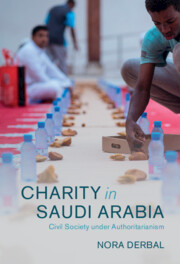Book contents
- Charity in Saudi Arabia
- Cambridge Middle East Studies
- Charity in Saudi Arabia
- Copyright page
- Dedication
- Epigraph
- Contents
- Figures
- Tables
- Acknowledgments
- A Note on Conventions
- 1 Introduction
- 2 Meanings of Welfare
- 3 Managing Poverty and National Development
- 4 Negotiating Citizenship and Belonging
- 5 Fun, Freedom, and Personal Growth amid Rising Repression
- 6 Conclusion
- Select Bibliography
- Index
- Books in the Series
2 - Meanings of Welfare
The First Women’s Welfare Association in Jeddah
Published online by Cambridge University Press: 14 July 2022
- Charity in Saudi Arabia
- Cambridge Middle East Studies
- Charity in Saudi Arabia
- Copyright page
- Dedication
- Epigraph
- Contents
- Figures
- Tables
- Acknowledgments
- A Note on Conventions
- 1 Introduction
- 2 Meanings of Welfare
- 3 Managing Poverty and National Development
- 4 Negotiating Citizenship and Belonging
- 5 Fun, Freedom, and Personal Growth amid Rising Repression
- 6 Conclusion
- Select Bibliography
- Index
- Books in the Series
Summary
This chapter discusses how Saudi women have actively negotiated gender boundaries and expanded their scope through the daily practice of charity work and the networks established among fellow social workers and volunteers. Founded in 1961–2 as a women-only initiative, the First Women’s Welfare Association in Jeddah counts among the oldest extant welfare associations in the kingdom enlisted with the Ministry of Social Affairs. The longue-durée perspective adopted in the chapter pays attention to the changing aspirations of different generations involved with the charity organization.
Although the First Women’s Welfare Association is often considered a "traditional charity" with an "Islamic aid" approach, its focus on single women, female-headed households, and the feminization of poverty transgresses traditional norms in multiple ways. The chapter discusses the charity’s use of donations, zakat and ṣadaqa, food banks, endowments, and shelters for single women and female-headed households. By situating practices of almsgiving within the wider legal and political framework of the zakat tax imposed by the Saudi state, as well as within the context of further legislation targeting money laundering and terrorist financing, the research highlights that religious ideals are subject to interpretation and object to various authoritative claims.
- Type
- Chapter
- Information
- Charity in Saudi ArabiaCivil Society under Authoritarianism, pp. 39 - 120Publisher: Cambridge University PressPrint publication year: 2022

